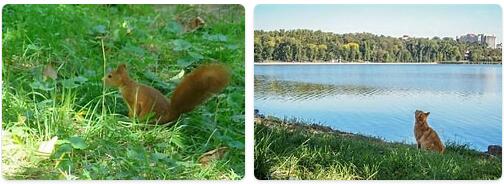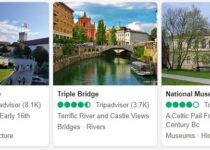Geography of Moldova
Where is the country of Moldova located on world map? According to COUNTRYAAH.COM, Moldova is an independent nation located in Eastern Europe. The country of Moldova gained independence on August 27, 1991. This was a momentous day in the history of Moldova as it marked the end of Soviet domination and the start of a new chapter in the nation’s history. The day was declared a national holiday and large celebrations were held throughout the country. People from all walks of life gathered in cities and villages to celebrate their newfound freedom. The main event was held in Chișinău, where the first president of Moldova raised the national flag for the first time and declared independence. This day is remembered fondly by all Moldovans as they look back on this milestone which marked their journey towards self-determination. See historyaah for Moldova history.
Nature
Moldova is part of the Russian platform and is mainly confined by the river Prut in the west, which joins the Danube at the far south. In the eastern part flows Dnestr; both rivers and several smaller ones in between flow out via the Bugeac plain to the Black Sea. The Precambrian rocks are overlain by rocks from the Cretaceous period, mainly sandstones. The soil is largely made up of loose soil, the soil of chestnut soil. In the loose ground cover, the many rivers have cut deep river valleys, with nips especially on the western sides. Incidentally, the topography is not varied. The highest peak is Bălănești (429 m above sea level) in the western foothills of the Moldovan Plateau.
Moldova has a continental climate with cold winters and hot to hot summers. It is particularly cold in winter when eastern winds blow in from Siberia. The average temperature in Chișinău is about 21 °C in July and −4 °C in January. Precipitation falls from about 600 mm per year in the north to about 400 mm in the south. Chișinău has an average annual rainfall of 530 mm. The precipitation falls mainly as showers during the summer months, especially in June-July.
Less than 7% of the area is wooded; the most common trees are beech and oak. The country’s original vegetation is grass steppe, but this has largely given way to cultivation.
Nature conservation

Moldova’s nature protection does not include private property and the areas are therefore severely limited; only about 2% of the land area is protected (2012). There are no national parks. The largest nature conservation areas, Padurca Domneasca (60 km2) and Plaiul Fagului (56 km2), are scientific reserves.
At the end of 2003, Moldova was not only Europe’s poorest country, but also had the largest index of human trafficking and organ trafficking – especially kidneys. The donors are predominantly operated in Turkey, and their organs are then sold to Israelis, Arabs or Western Europeans.
In July 2004, an orphanage for orphans from the Trans-Dniester region between Moldova and Romania was closed. The home had housed 60 children. The region has a predominantly Russian-speaking population, and local authorities decided to close the home, which had only Moldavian education. Police cleared the home without thought of the children being sent directly onto the street. Romania replied that the Trans-Dniester authorities pursued an ethnic and linguistic cleansing policy and asked for EU support to require the home to be reopened. Transnistrian Minister of Education, Yelena Bomeshko, denied that the home was closed for ethnic reasons and declared it closed because it did not have the necessary permits from local authorities to educate the children.
- AbbreviationFinder: Offer a full list of commonly used abbreviations, acronyms, and initialisms related to the state of Moldova.
Relations between Chisinau and Moscow had been severely deteriorated as early as 2003, when Voronin rejected a Russian proposal for the Trans-Dniéter separatist enclave, leaving Russian troops – who had never escaped Moldovan territory – to remain in Trans-Dniéter until at least 2020. Moscow threatened to leave the Dumaadopt sanctions against Moldova. Up until the March 2005 parliamentary elections, the situation deteriorated further. Voronin expelled 20 Russian nationals, accused them of being spies and did not allow 100 Russian election observers to enter Moldova. The election was won by Voronin and his Communist Party – who, however, do not have much ideological thinking left over from the Soviet era. Voronin’s position was thus strengthened and he was increasingly oriented towards the EU. A month later, Parliament voted almost unanimously for Voronin as president and Vasile Tarlev as prime minister.
In June 2005, Parliament asked Russia to withdraw all of its troops in Trans-Dniets by the end of 2006. The request came after a special session in which Parliament had discussed a Dnestr peace proposal made in April by Ukrainian President Viktor Yushchenko. The Russian-speaking population of the Dnestr had disintegrated after the civil war in 1992. Russia had sent 1,200 soldiers to the region at the same time, and during a conference in Istanbul in 1999, had promised to demilitarize the area by the end of 2003. But in the years leading up to 2005, Moscow had maintained that a troop presence was still needed to secure peace and weapons depots from Soviet era.
Following demands from the EU on the control of smuggling goods, the government began in March 2006 to demand that all goods imported into the country be subject to customs duties. This also applies to goods from Ukraine that enter through Trans-Dniéter. This led to protests by Trans-Dniets who perceived the move as hidden financial sanctions. Chisinau, in turn, criticized Moscow for halting imports of Moldovan wine. The Russians cited health risk as the cause, but Moldova claimed that political motives were behind it.
In 2007, the country was plagued by the most severe drought in 50 years. The lack of rainfall affected 80% of the country and in July the temperature for two weeks was above 40 ° C. Voronin announced that imports of flour and cereal products would be exempt from duty. This was done in an attempt to secure the supply of cheap bread, which is the main ingredient in the Moldavian diet. The government also asked the international community for help to avoid a food disaster as most of the country’s agricultural production was lost in the drought.


